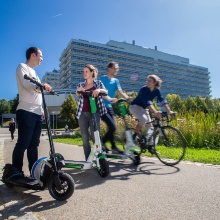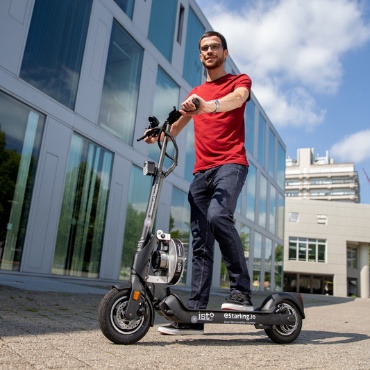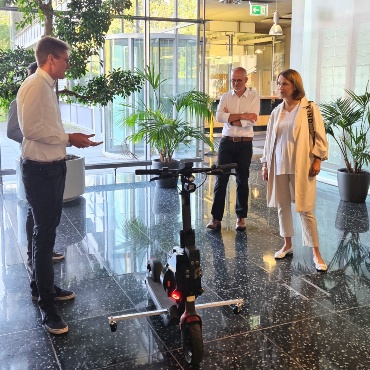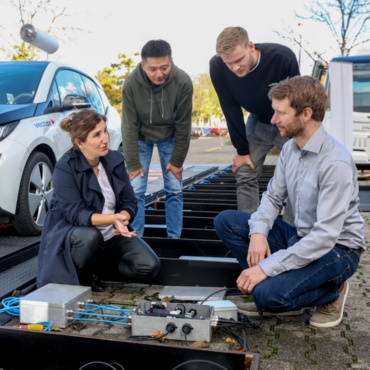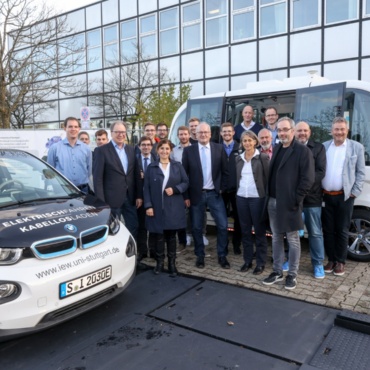In the MobiLab, the University of Stuttgart is developing its vision of a car- and emission-free campus. The campus will be a testing ground for challenges of the future, on which new climate-neutral, electric, and intelligent forms of mobility will be researched, developed, and tested. Fields of research include autonomous vehicles, concepts for road planning, and parking facilities. Thus, the MobiLab will also be an incubator for startups.
In the MobiLab real-world laboratory, we test our research on sustainable, intelligent mobility directly on Campus Vaihingen.
Prof. Peter Middendorf, Rector of the University of Stuttgart
A car-free campus thanks to new mobility concepts
The Campus Vaihingen as a location has a supra-regional significance. In the future, people could arrive at the Vaihingen Campus via a single parking facility adjacent to the campus. The parking facility and the S-Bahn (urban train) station will be connected to the campus via self-driving shuttles. A rental system with autonomous e-scooters will support the shuttles and improve the mobility on the campus. The new mobility concepts are intended to reduce the demand for parking spaces by about one third.
The Campus Vaihingen is located in the southwest of Stuttgart, which is the capital of the state of Baden-Württemberg. It is surrounded by green spaces on three sides and borders several smaller residential areas to the east. Therefore, it cannot be enlarged beyond its existing boundaries.
It is one of two main locations of the University of Stuttgart. In addition, the Vaihingen Campus houses the Stuttgart Media University, various Fraunhofer institutes, the Stuttgart site of the German Aerospace Center (DLR), and numerous other larger and smaller institutions. Furthermore, there is a wide range of residential places with associated facilities for students.
As regards public transport, the campus is connected to both Stuttgart Central Station and Stuttgart Airport via the S-Bahn stop “Universität”, and travel times are short. In terms of road traffic, it is located directly adjacent to the B14 federal highway, which connects it to both the highway network and Stuttgart’s city center. Currently there are nearly 4,000 parking spaces available on the campus.
[Photos: o.A., Dan Greiner IFS/FKFS/University of Stuttgart, o.A., o.A.]
Press review on MobiLab
- Podcast "Die Wegbereiter" with David Meister (IST) on the autonomous e-scooter [de]
July 15, 2024 - Regio-TV: Unlimited range through dynamic charging? [DE]
February 25, 2023 - SWR2 Wissen: Inductive charging of e-cars while driving is getting better [DE]
February 20, 2023 - SWR Wissen: Inductive charging while driving [DE]
February 17, 2023
Funding
The MobiLab is funded by the Ministry for Science, Research and Art with a total of EUR 5 million over a period of four years.
News about the car-free campus
[Photos: euRobotics / Visual Outcasts, o.A., o.A., o.A., University of Stuttgart, University of Stuttgart, o.A., o.A.]
MobiLab is regionally and internationally connected
- Sustainable mobility as a contribution towards an emissions-free campus [de]
University and business region decides on memorandum - u.mob
As part of MobiLab, the University of Stuttgart has joined the European university initiative u.mob, which wants to develop and test joint solutions related to sustainable mobility in a university context
Kontakt

Markus Friedrich
Prof. Dr.-Ing.Head of Chair for Transport Planning and Traffic Engineering

Lydia Lehmann
Deputy Head of University Communications


